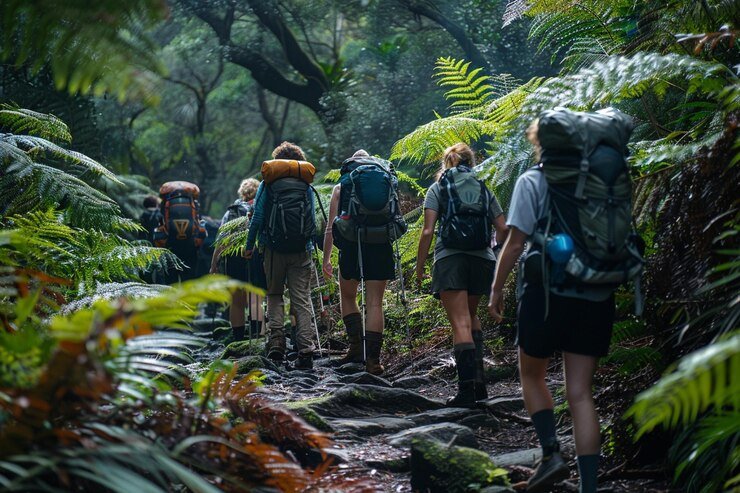Future Trends in Ecotourism: What to Expect?
Introduction
Ecotourism is a constantly evolving sector, driven by new technologies, behavioral changes, and post-pandemic adaptation. In this article, we will explore the future trends of ecotourism and how they are shaping travelers’ experiences while positively impacting the environment.
Growth of Low-Impact Tourism
With increasing concern about the ecological footprint of travel, low-impact tourism is becoming a popular choice among travelers. This involves slower and more sustainable travel methods, such as long-distance hiking, cycling, and railway tourism, reducing the use of highly polluting transportation like airplanes and cruises.
Destinations that encourage sustainable transport modes and eco-friendly accommodations are standing out in this scenario. Additionally, tourists are increasingly willing to pay extra to offset their carbon emissions, supporting initiatives that promote environmental impact neutrality.
Community-Based and Inclusive Ecotourism
The future of ecotourism is also strongly linked to inclusion and the active participation of local communities. Community-based ecotourism projects that value traditional knowledge and provide economic benefits to local residents are growing globally.
This trend also includes making ecotourism accessible to different traveler profiles, including people with disabilities and families with young children. Companies and governments are investing in the necessary infrastructure to ensure that sustainable experiences are available to everyone.
Biodiversity and Conservation Integrated into Tourism
Biodiversity preservation is one of the pillars of ecotourism and will continue to be an essential trend in the future. Initiatives that combine tourism with wildlife and flora conservation are becoming increasingly common, allowing travelers to contribute directly to ecosystem protection.
Experiences such as wildlife observation tourism, participation in species reintroduction projects, and tourism in private environmental reserves are gaining popularity. Environmental education will also play a crucial role in raising tourist awareness of the importance of conservation.
Adoption of Renewable Energy in Eco-Friendly Destinations
Another fundamental aspect of the future of ecotourism is the adoption of renewable energy sources in eco-friendly accommodations and natural parks. Many destinations are investing in sustainable energy infrastructure, such as solar panels, wind turbines, and rainwater harvesting systems.
These initiatives not only reduce the carbon footprint of tourism establishments but also serve as inspiring models for other industries to adopt sustainable solutions.
1. New Technologies: Innovations Transforming Ecotourism
Technology is revolutionizing how tourists interact with nature and travel experiences. Some of the most promising innovations include:
- Augmented and Virtual Reality: These technologies allow tourists to have immersive experiences, exploring natural destinations interactively even before physically visiting the location.
- Sustainability Apps: Digital tools help travelers calculate their carbon footprint, find sustainable accommodations, and choose activities that respect the environment.
- Drones and Environmental Monitoring: The use of drones to monitor ecosystems and wildlife has become common, enabling ecotourism operators to offer educational experiences based on real data.
These technologies not only enhance the tourist experience but also promote more sustainable practices within the sector.
2. Behavioral Changes: What Tourists Want
Modern tourists are becoming increasingly aware of the impact of their travels. The main demands include:
- Authentic Experiences: Travelers seek real connections with nature and local communities, preferring cultural immersions over traditional sightseeing tours.
- Sustainability: Environmental concerns are a priority. Tourists prefer operators that demonstrate a commitment to environmental preservation and promote sustainable initiatives.
- Health and Well-Being: After the pandemic, there has been a growing interest in travel that prioritizes mental and physical health, such as nature retreats and wellness experiences.
Meeting these new expectations is essential for ecotourism operators who want to stand out in a competitive market.
3. Post-Pandemic Ecotourism: Adaptations and Resilience
The COVID-19 pandemic brought unprecedented challenges to the tourism sector but also opened doors for new opportunities in ecotourism. Some adaptations that are becoming established include:
- Proximity Tourism: With travel restrictions, many tourists are exploring destinations closer to home, boosting local ecotourism and helping to reduce the carbon footprint.
- Increased Demand for Outdoor Experiences: Outdoor activities such as hiking, camping, and cycling tours have become more popular, reflecting a growing desire for nature and isolation.
- Health and Safety Protocols: The industry is adopting strict hygiene and safety measures to ensure tourists feel safe during their experiences.
These adaptations not only helped the industry recover but also created a new ecotourism model that values resilience and sustainability.
Conclusion
The future of ecotourism is intrinsically linked to innovation, sustainability, and collective awareness. With the advancement of technology, the adoption of regenerative practices, and the active involvement of local communities, ecotourism will continue to grow as a viable and essential alternative for more responsible tourism. By embracing these trends, travelers, businesses, and governments can ensure that ecological tourism not only survives but thrives, benefiting both the environment and future generations.
These ecotourism trends reveal a sector in transformation, where new technologies, behavioral changes, and post-pandemic resilience are shaping the traveler’s experience. For those looking to explore the world sustainably, ecotourism presents itself as a viable and attractive option.







